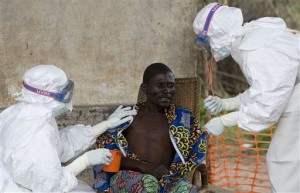
File photo of a 43 year old Congolese patient, center, who has Ebola hemorrhagic fever, is comforted by Medecins Sans Frontieres (Doctors without Borders) nurse Isabel Grovas, left, and Doctor Hilde Declerck, right, in Kampungu, Kasai Occidental province, Congo. In the four decades since the Ebola virus was first identified in Africa, treatment hasn’t changed much. There are no licensed drugs or vaccines for the deadly disease. A number are being developed, but none have been rigorously tested in humans. One experimental treatment, though, was tried this week in an American aid worker sick with Ebola, according to the U.S-based group that she works for in Liberia. Without a specific treatment, doctors and nurses focus on easing the disease’s symptoms _ fever, headache, vomiting and diarrhea _ and on keeping patients hydrated and comfortable.
DAKAR, Senegal (AP) — The World Health Organization (WHO) says the death toll from the worst record outbreak of Ebola has reached 887.
That’s an increase of 158 since the global health body released figures on July 31.
WHO said in a statement on Monday that there now have been more than 1,600 cases of Ebola since the disease emerged in Guinea earlier this year.
The news comes as Nigeria announced Monday that it now had confirmed a second case in Africa’s most populous nation. The patient is a doctor who treated the man who died in Nigeria last month.
According to WHO, there now have been a total of 358 deaths in Guinea, 255 deaths in Liberia, 273 deaths in Sierra Leone and one in Nigeria.

